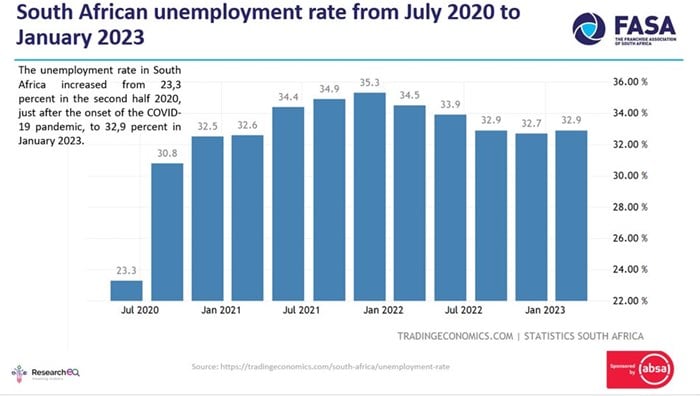The Franchise Association of South Africa (Fasa), for the past two years has worked tirelessly with different stakeholders in government and business to forge partnerships that stimulate entrepreneurship, drive affordable and responsive funding initiatives, and develop training and development projects which would ultimately help with job creation.
Says Fasa’s CEO Fred Makgato, “in the run up to the elections in May and for the rest of the year and because of the political landscape shifts on the back of the election results and the possible ‘freezing’ of posts and initiatives, this could have a detrimental effect on business confidence and growth. We, as the franchising sector, are concerned and want to counteract this non-productive year by driving our own growth initiatives based on the positive results of our Fasa/Absa Franchise Survey conducted in 2023.”
At the end of 2023, Fasa was on the verge of signing an MOU with the Department of Small Business Development as well as engaging with the Department of Trade and Industry and Competitions with regard to the accreditation of the Franchise Industry Code and the establishment of the Franchise Industry Ombud.
“Whilst progress was made, albeit slowly, with the elections coming up in May and the uncertainty of what lies ahead, we fear we may be back to square one if we don’t pro-actively introduce initiatives and events ourselves to stimulate and keep our sector thriving and buoyant.”
The power of franchising ... to provide employment
Fasa’s Franchise survey, released in 2023 showed that the industry had increased its contribution to gross domestic product from 10% to 15% over the past ten years through its over 700 franchise systems and over 45,000 franchise outlets making it a significant contributor to the South Africa economy – contributing in the region of R999bn.
According to James Noble, head of Wholesale, Retail and Franchise at Absa Relationship Banking, the sponsor of the Fasa Franchise Survey, “more importantly, in our strained economy, it showed much better business confidence levels among franchisees and franchisors than in the broader economy and reflected optimism that turnover would flow over the next twelve months.”
The survey looked at the country’s dire unemployment figures and then honed in on the role that franchising plays in providing employment – both directly to close to 500,000 people – and even more indirectly through its partners and suppliers.
In South Africa greater income inequality, growing dependence on government, and more mass migrations are a few of its most pressing problems – of which providing jobs for the overwhelming number of unemployed, especially the youth which has reached almost 60% should be their number one priority.
In addition, failing to train the next generation of workers for the digitally driven economy will result in us being left behind the rest of the world.
Says Maria D’Amico, Fasa chair; “We would like to see government give more support to the positive role that franchising can play in stimulating the small business sector and also appeals to big business to look at the potential of using the franchise format as an expansion mechanism.”
Some of the statistics from the 2023 Fasa Franchise Survey sponsored by Absa, include the following:
- The unemployment rate in South Africa increased from 23,3% in the second half of 2020, just after the onset of the Covid-19 pandemic to 32, 9% in January 2023.
- According to Stats SA, there were 8,818,000 full-time and 1,152,000 part-time employees in South Africa in the first quarter of 2023. Based on these numbers, it appears that the franchise sector accounts for an estimated 4,7% of employment in this country, which translates into an estimated 471,233 employees.
- In each franchised outlet, there are 24 [17] staff members, including the franchisee him/herself; 21 [15] of these employees are full-time staff members and 3 [2] are part-time employees; 2, 2 [2, 5] are management and 14, 5 [15, 7] are non-management, the average ratio between management and staff being 1: 7.
- Black employees made up the largest proportion of staff members in franchisee outlets. The employee ratios were 60 Black: 20 White: 9 Coloured: 11 Indian. The average number of Black employees increased from 11, 9 to 14, and 4.
- In an average franchise system, 8,5% are franchise management, 38,3% are franchisor staff, 7,7% are franchisee management and 45,5% are franchisee staff.
The power of franchising .... as a skills incubator and business enabler
One of the biggest challenges is how to stem the rise in unemployment that inevitably leads to inequality, crime and instability. Franchising over the past fifty years has, and can provide many more jobs given the right support and operating environment and Fasa’s partnership with INANI and the Services SETA offers employers tax benefits and deductions through its talent incubator and business enabler programmes.
With Government committed to allocating large training and empowerment funds to be utilized for improving the plight of the majority of South Africans, FASA has embarked on getting professional qualifications approved, developed and registered and has been working with the Services SETA in the development of qualifications for the franchising sector.
Says Fasa CEO Fred Makgato, “after 16 years of Inani working with the Seta’s on behalf of Fasa, the Services SETA MOU with Fasa was signed two weeks ago and is also now moving forward as part of the Services SETA SMME's development project, amongst and as part of other upcoming initiatives to be discussed and finalised with the Services SETA.”
The NQF level 6 Franchise Manager Occupational Qualification is now registered, with the qualification's NQF level 5 being targeted next and placed on the 'priority short listed' for development. All franchises are encouraged to look into these initiatives to benefit not only themselves but to add to the jobs market.
The power of franchising ... to stimulate entrepreneurship
Franchising in South Africa has evolved into an ideal avenue for both entrepreneurs seeking investment opportunities and financing institutions seeking viable ventures. In a climate where traditional employment avenues are limited, the allure of entrepreneurship through franchising is powerful.
Despite the challenges in securing traditional jobs, entrepreneurship presents limitless possibilities. With its proven business model and built-in support structures, franchising emerges as a compelling solution.
Benefits of franchising
According to James Noble, who heads up the Franchise division of Absa Relationship Banking and sits on the board of the Franchise Association, “one of the main benefits of franchising is the reduced risk and increased profitability and provides a safer way of getting into business and becoming financially independent.
The support of a franchisor and the value of brand recognition still outweigh the risk of starting a business on your own. Franchisors can assist with lease negotiations, product and supplier arrangements, marketing of the business and raising finances and services from the bank at affordable rates to reduce operational costs.”
Makgato underscores the importance of face-to-face interactions in the franchising journey. "Starting a business can be overwhelming," he says. "By engaging with potential franchisees in person, franchisors can provide valuable insights, alleviate doubts, and make the decision-making process smoother. We hope that our initiatives will carry the positive momentum of franchising through this challenging year and onto greater things.”
Download the 2023 Fasa/Absa Franchise Survey













































